- Home
- Pam Weaver
For Better For Worse Page 3
For Better For Worse Read online
Page 3
Of course, Henry could see how upset she was and he was kindness itself.
‘It’ll be all right, darling,’ he’d nuzzled in her ear. ‘Don’t let it spoil our special day,’ and his tender kisses helped to take some of the disappointment away. So long as she did what he told her, Henry was her hero, her knight in shining armour.
Instead of a reception, they’d had a meal in a pretty restaurant. Somehow the people found out that they’d just got married (probably Henry’s doing again) and they’d made a huge fuss of them, giving them a free glass of wine each and handshakes all round. Annie blushed modestly and thought herself lucky or blessed or a mixture of both. Henry was light-haired, suave and sophisticated and, in her eyes, even better looking than Ronald Colman, the star he so much admired. He was so loving and caring as well. Her honeymoon nights spent right here in their own home were full of his lovemaking and her days packed with his kisses. He paid her compliments all the time and she was convinced that she would be the envy of all her friends if ever she got to tell them. Henry wasn’t one for visiting. He said he preferred them to spend their weekends by themselves, so she hadn’t seen anybody for ages. Still, it didn’t matter. Not really. She smiled to herself. Henry was so romantic, just like the film stars at the pictures. Whenever she and Henry went out, he was even mildly jealous when other men looked at her. She’d laugh gaily and tell him it was his own fault because he would keep buying her pretty dresses and scarves as well as things that were for his eyes only in the bedroom. Henry was exciting, passionate and all hers …
When she’d written to tell her parents they were married, Mum wrote back protesting that they’d never received the invitation.
‘Of course they did,’ Henry had said crossly. ‘I posted it myself.’
‘I’ll pop over and see them,’ she’d said, but Henry didn’t feel it was wise.
‘Why ever not?’ she’d protested.
‘Leave it for a while,’ he’d counselled. ‘Let things settle down.’
Annie was reluctant, but then her new husband had given her a wounded look and complained that everyone was ganging up on him, so she’d let it go.
Annie had settled down to domesticity and looking after Henry. He wouldn’t hear of her getting a job. ‘No wife of mine will ever have to go out to work,’ he’d declared stoutly. It was fun at first, but she soon got bored.
She had only been married for five months when she discovered she was pregnant. Henry was over the moon and did his best to treat her like a piece of delicate china.
‘I’m only pregnant,’ she’d laughed, ‘not ill.’
Henry had screwed up his nose. ‘Don’t use that word, darling,’ he said. ‘It sounds so vulgar.’
She was taken aback. ‘Then what …’
‘Say you’re in the family way,’ he said, kissing her ear. He was funny like that. Prudish over some things and yet such an accomplished lover in the bedroom. She supposed it might be because of his Rhodesian upbringing. Henry had come to this country as a boy to get an English education and for some reason far beyond Annie’s understanding, had never gone back.
As soon as she heard Henry moving about upstairs, Annie put a pan of water on the gas stove and lit the flame underneath. She took the loaf out of the breadbin and unwrapped it. She always kept it covered with a damp tea towel to keep it fresh. Her neighbour, Mrs Holborn, had given her that useful tip. All she had to do now was make the tea.
Annie had met Henry just over a year ago. He didn’t talk much about his past or his wartime experiences because he had been captured in the early days and spent almost all of the war years as a POW. He was a lot older than her. She was eighteen and he was thirty-six today. She’d adored him from the start, but her father, who had taken Henry on in the jewellers’ shop, had been more cautious.
‘He’s deep that one,’ Father had said. ‘He may be a good worker, but we don’t really know much about him.’
Of course, her parents were concerned because their courtship had been so short. ‘All I know is that I love him and he loves me,’ Annie had said stoutly, and now that Henry was her husband and she was expecting his baby, she had high hopes that Henry and her father would make friends again.
‘I know Father can be difficult,’ she’d pleaded with Henry, ‘but please try and like him just a little bit.’
‘I do, darling,’ Henry protested. ‘Really I do, but the man is impossible.’
She sighed. Perhaps he was right. She’d written to her parents several times, but they’d never replied.
She could hear Henry coming out of the bathroom, so she put the eggs into the boiling water and two slices of bread under the grill.
‘What are you doing up so early?’ he asked as he walked into the kitchen.
She indicated his chair and he sat down. Putting her arms around his shoulders, she kissed the top of his head. ‘Two boiled eggs, three minutes, just as you like them, coming up,’ she said, putting the toast and butter in front of him.
Henry smiled. ‘Thank you, darling.’ He patted her arm. ‘When I’ve gone to work, I want you to go back to bed.’
‘Henry, I’m fine,’ she said, reaching for the teapot.
‘A woman in your condition …’ Henry began again.
‘Please don’t worry about me,’ she protested as she put one egg in the egg cup and the other on the plate. ‘I’m fine.’
‘Please don’t argue with me,’ he said, his pale eyes narrowing slightly. ‘I think that as your husband, I’ll be the judge of what’s best.’
‘Yes,’ she faltered. She mustn’t make him angry. It was a bit scary when he shouted. ‘You’re right. I’ll go back and lie down once you’ve gone to work.’
‘I only have your best interests at heart,’ he said, slicing off the top of the egg smartly with the knife. The yolk, a thick, rich orange, spilled over the side of the egg cup and onto the plate. ‘Yours and the baby’s.’
‘I know,’ she sighed. She sat opposite him and drank her tea, but she was in no mood to eat.
As her pregnancy advanced, Henry was most insistent that she lead a quiet life. ‘First babies can be difficult to carry,’ he told her. ‘I want you to rest as much as possible.’
As he constantly reminded her, Annie had promised to love, honour and obey him, but at times it was very boring. She cleaned the house and did the shopping, always remembering to buy his favourite coffee crunch sweets and settling into a weekly routine. On Mondays it was washing, Tuesday cleaning upstairs, Wednesday she did the ironing and Thursday she tackled the downstairs. On Friday it was a little light gardening until she got too big and then it was time to get the sewing machine out and make a layette for the baby. On Saturdays and Sundays Henry was home so she read books and knitted and sometimes they went for a walk. She loved the little market town. It seemed so bright and cheerful after the war. She loved the striking façade of the Black Horse Hotel with its pretty window boxes, and the Carfax, a sort of market square with its own bandstand. Even the posh new toilets in the Bishopric were a talking point, but with so little else to stimulate her mind, Annie could hardly wait for the baby to come.
A man came to decorate the nursery. He was good-looking, funny and friendly, but Henry said he didn’t like the standard of his work, so they had to find another. The new man turned out to be rather dour, but despite his advancing years, he got the job done eventually.
She set her teacup down on the table. ‘I thought I might write to my mother and ask her over,’ she said as he tucked into his second egg.
‘I don’t think so,’ said Henry tartly. ‘You know how awkward your father can be and I won’t have you upset.’
Disappointed, she showed no emotion as she handed him a present. ‘Happy birthday, darling.’
‘Birthday? Oh! So it is.’
She was slightly surprised that he hadn’t bothered to remember his own birthday, but his enthusiastic praise for the box of handkerchiefs she’d given him put her in a better mood. She went
with him to the front door but he kissed her in the hallway.
‘Don’t let anyone see you looking like that,’ he said, pushing her behind the door. ‘Back to bed now.’
Using the door as a shield, she lingered in the hallway and blew a kiss as he closed it. After that, she went into the sitting room to watch him go towards the station. Across the street, she saw a woman walking in the opposite direction suddenly dart into the gateway of a house. Lifting the net curtain, Annie watched her husband’s back until he reached the end of the road and walked out of sight. When she turned her head again, the woman was still there. She seemed to be watching Henry as well, but who was she? Annie had never seen her before. She was elegantly dressed in a lilac two-piece. The jacket had a nipped-in waist and the flowing skirt was a perfect imitation of the New Look. She wore a small, brimmed hat with a circle of netting on the side. She seemed rather nervous as she watched Henry go to the end of the road, moving her clutch bag from one hand to the other. She waited until he’d turned the corner before she came out onto the pavement again and, opening her bag, she took out a cigarette case. Annie watched her take one out and put it between her lips and, as the woman fired her lighter, she turned towards the house to shield the flame. Her cigarette lit, the woman looked up and their eyes met. They stared at each other for a split second then, as the woman took a long drag on her cigarette, Annie let the curtain drop. A moment later, the woman turned and walked on.
‘That’s funny,’ Annie murmured to herself as she turned for the stairs.
*
She found herself trembling from head to foot and her heart was racing like the clappers when she saw him. She hadn’t expected to bump into him in the street. If she’d been on the same side of the road, she would have walked right into him. Luckily, when he’d come out of the gate, he’d had his head down and was brushing something from his trouser leg. That had given her just enough time to dart into the nearest garden, but she had watched him walking briskly down the street with his head held high until he’d turned the corner. Arrogant sod. Now that he’d gone and she was back on the pavement, she didn’t know why she hadn’t confronted him there and then. It would have been the perfect opportunity and they were quite alone in the street.
She hadn’t expected to see the girl either. So young … she only looked about sixteen. She threw the half-smoked cigarette into the gutter and hurried on. Tears were biting the backs of her eyes, but she wasn’t going to give way. She knew exactly what to do.
Her car was at the end of the street. She opened the door and threw in her handbag. Once in the driver’s seat, she fumbled for another cigarette. Drawing deeply, she felt the rage inside her subsiding slightly but not the anger. That was cold and calculating. Nobody wanted their dirty linen washed in public, but enough was enough. She was rational enough to want it all done properly and that would take time. He was not going to get away with it, not this time. It might be unpleasant, but he had to be stopped. Putting the key in the ignition, she revved the engine a couple of times and set off.
*
Sarah could hear raised voices next door. She tried to block out the sound because she was concentrating on Mr Millward’s books, but then she heard the sound of a loud thump, someone falling and Mrs Rivers crying out. Sarah took off her shoe and banged on the wall. She wasn’t brave enough to confront Nat Rivers face to face, but she wanted him to know that someone was listening. She heard him curse and a few moments later, the door slammed and he walked by the kitchen window. Sarah dashed to the front door and slid the large bolt at the top seconds before Nat tried the doorknob. Her heart was pounding as she turned the key in the lock and shot the bolt at the bottom of the door. On the other side, Nat kicked the wood. ‘You stay away from my mother,’ he shouted through the letter box. ‘Keep your interfering nose out of my business.’
Sarah pressed herself against the wall and said nothing, but as soon as he’d gone down the road, she went to the wooden partition between the kitchen and the scullery. ‘Are you all right, Mrs Rivers? Mrs Rivers? Shall I come round?’
‘I’m fine,’ her neighbour called shakily. ‘I dropped the coal bucket, that’s all.’
Sarah respected her wish not to be disturbed, but she wished she could have gone in to check.
‘Sarah dear?’ Mrs Rivers called a few minutes later.
‘Yes?’
‘I think it better if you don’t come round for a while. Is that all right?’
Sarah swallowed the lump in her throat. ‘Are you sure? I’m not scared of him.’ It was a lie of course, but there was nothing to stop the two of them getting together when Nat wasn’t around.
‘I think it’s best, dear.’
Reluctantly, Sarah went back to her paperwork, but her mind was all over the place. She hadn’t wanted to believe Mr Millward when he’d told her about Henry. She’d tried to tell herself he was wrong, or that it was a case of mistaken identity, but the man was adamant. He had definitely seen her husband in Horsham. All the same, Sarah had to see for herself. Her greatest problem was getting over there. She had no spare money for the bus fare and besides, who would look after the girls? She could try Vera, but she was finding it increasingly difficult to ask her for help.
It took quite a while to plough through the mountain of paperwork Mr Millward had given her, but gradually she made sense of the books. Over the past few weeks, he’d been delighted with her work and they’d become friends. He was no oil painting but he was a good man, she could see that now. He was ambitious too. He’d lost everything in the war, his wife and his home, so he had to start all over again. The coal yard, he’d told her, was only the beginning and now that his books were straight and he could see that he was doing quite well, it was time to expand.
Then this morning he’d turned up at her house unannounced. ‘I’m planning to go into the haulage business,’ he told her. ‘I’m not getting any younger and humping coal is a young man’s job.’
She’d smiled encouragingly as she’d passed him a cup of tea. What was he trying to tell her? That he wouldn’t be needing a part-time bookkeeper anymore? That she’d lost the position?
‘I need a couple of lorries,’ he went on.
Sarah stirred her tea, trying not to notice his protruding nasal hairs.
‘So I’m going to Horsham next Thursday,’ he said. ‘This chap I know can get hold of ex-army surplus stuff at a knock-down price.’
Sarah nodded. ‘I hope it’s all legit.’
‘It is,’ he said. ‘I’ve checked. The thing is, if you want to see that husband of yours, you and the kids can come with me in the lorry if you like.’
Sarah hesitated. Confront Henry outright? It was a tempting thought.
‘I have to pick Jenny up from school at three,’ she said cautiously.
‘I’m not seeing the bloke until six-ish,’ said Mr Millward. ‘I can pick you up after you’ve got the kiddie, if you like.’
Sarah’s hand went to her mouth. The timing couldn’t have been better. It was an opportunity too good to miss.
* * *
Annie Royal lifted the net curtain to dust the already dustless window ledge then glanced back at the clock. Ten thirty. Mrs Holborn from next door would be here at any minute. Annie returned to the kitchen to boil the milk in readiness for their morning cup of Camp coffee. She had only just put the pan of milk on the stove when there was a sharp rap on the back door. ‘Come on in, Mrs Holborn.’
Her neighbour took off her coat and hung it over the back of her chair and after swapping comments about the weather, the two women sat down. They were as different as chalk and cheese but their shared loneliness had drawn them together for their twice a week coffee times. On Thursdays, Annie would go next door to Mrs Holborn’s place and today, Tuesday, Mrs Holborn came to her. They were both housewives. Mrs Holborn, a woman of fairly mature years, spent her time looking after her sick husband. She also had the responsibility of caring for her aged mother-in-law who lived a couple of streets aw
ay and, on top of that, she had three strapping but lazy sons living at home. Annie was easily twenty-five years her junior, but the two of them enjoyed their little chats together.
‘How’s your Oswald?’
‘Much the same. He’s coughing up blood now.’
Annie frowned with concern. ‘Have you seen the doctor?’ Since the advent of the new National Health Service, it was so much easier to get medical help. Annie knew that if this had happened only a year ago and Mrs Holborn had to pay for the doctor to come, Oswald would have waited in vain.
Mrs Holborn nodded. ‘He’s sleeping now so I can’t stay for more than a minute or two today. They’re taking him up to the sanatorium in a couple of days, so I won’t be able to have you over for coffee on Thursday.’
Annie squeezed her hand. ‘Oh, Mrs Holborn, I’m so sorry … for your husband, I mean.’
‘It’s for the best, dear,’ said her neighbour. ‘I know it was Oswald’s wish to die at home but it can’t be helped. The TB has got a terrible hold on him now.’
Annie knew Henry wouldn’t like it if he knew Mrs Holborn was here. Because her husband was so sick, Henry was afraid she might ‘pass something on’ to the baby and had forbidden Annie to be with her, but how could she turn away a friend in need? Mrs Holborn had been so kind when they’d moved in and had given her such a lot of friendly advice. There was so much more to being married than she’d realised, and Henry liked everything just so. Annie had been at a bit of a loss to begin with, and when Henry got annoyed, she’d cried bitterly. Mrs Holborn had helped her master the New World cooker and had given her tips on how to make the rations go further. It wasn’t easy managing on an ounce of bacon, two ounces of butter and a shilling’s worth of meat a week, and Annie welcomed Mrs Holborn’s inventiveness when it came to making interesting meals. Her own mother hadn’t been near the place, but Mrs Holborn had not only been on hand to give her motherly advice, but she’d also been a pal to laugh with and sometimes a shoulder to cry on. Now the tables had turned and it was her turn to be there for her friend.

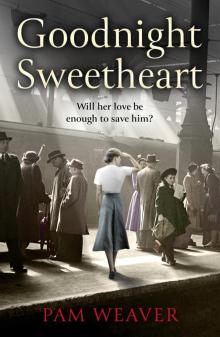 Goodnight Sweetheart
Goodnight Sweetheart At Home by the Sea
At Home by the Sea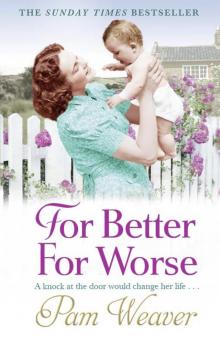 For Better For Worse
For Better For Worse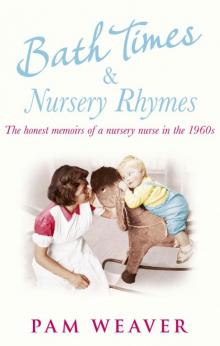 Bath Times and Nursery Rhymes
Bath Times and Nursery Rhymes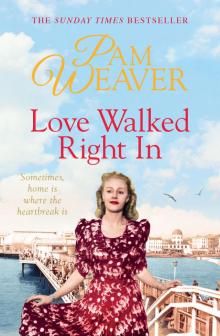 Love Walked Right In
Love Walked Right In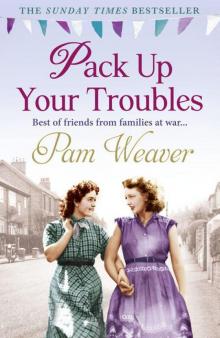 Pack Up Your Troubles
Pack Up Your Troubles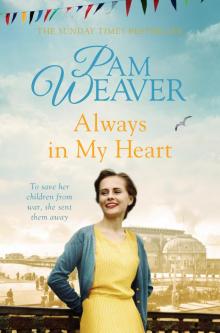 Always in my Heart
Always in my Heart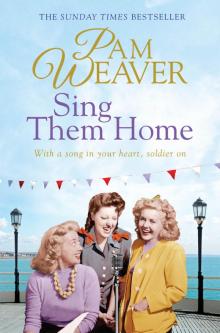 Sing Them Home
Sing Them Home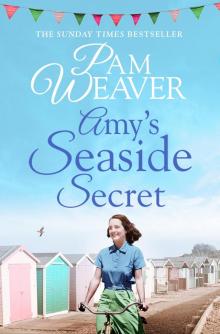 Amy's Seaside Secret
Amy's Seaside Secret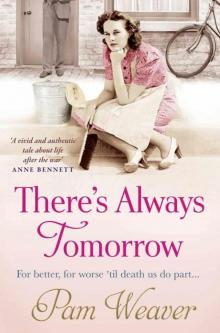 There’s Always Tomorrow
There’s Always Tomorrow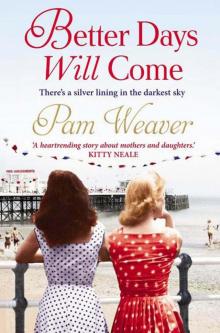 Better Days Will Come
Better Days Will Come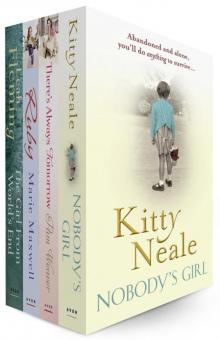 Family Drama 4 E-Book Bundle
Family Drama 4 E-Book Bundle